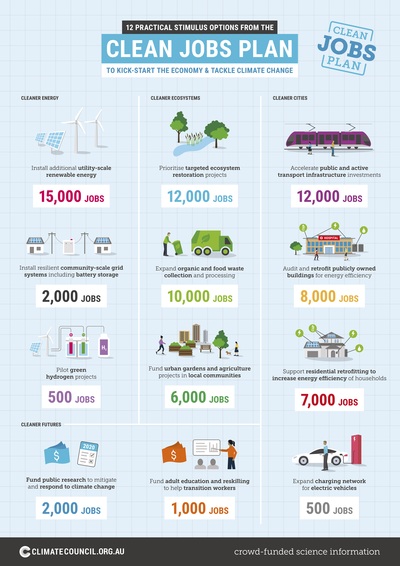Clean jobs can help repair the economy — and the climate

The Climate Council has identified that ‘clean jobs’ will help get Australians back to work and are the key to long-term emissions reductions.
With thousands of Australians out of work due to COVID-19, governments have a crucial role to play in making targeted investments and implementing policies that can put Australians back to work. The aim is to devise win-win solutions that create jobs and tackle long-term problems at the same time.
The Climate Council’s Clean Jobs Plan was devised to investigate how creating thousands of jobs can help Australia rebuild the economy and tackle climate change.
The plan identifies 12 major policy opportunities to immediately kickstart economic growth. Collectively, these opportunities represent 76,000 jobs. Job creation would start immediately and over a three-year period. These opportunities are deliberately targeted to regions and occupations hit hardest by job losses, and have the potential to grow the entire economy in the long term.

“Today we’ve seen preliminary government data for the year to June 2020 that indicates emissions have dropped because of the coronavirus,” Climate Council Head of Research Dr Martin Rice said.
“Lowering our emissions is critical to keeping Australians safe, but it must be done in a way that is sustainable.
“Unfortunately this drop is temporary and built upon the suffering of Australians and the economy. To reduce our emissions in the long term, we need credible climate policy and clean jobs,” Dr Rice said.
Climate Council Senior Researcher Tim Baxter said the latest government data indicated a record rollout of renewable energy that has reduced emissions in the electricity sector.
“However, emissions linked to Australia’s growing liquefied natural gas (LNG) exports have cancelled out that positive progress,” Baxter said.
“Gas is a fossil fuel, driving climate change, and right now Australia is the largest exporter of LNG in the world.
“What is deeply concerning is that the methane emissions from Australia’s gas industry are not being fully accounted for,” he said.
“Recent re-evaluations of the climate impact of methane have found that it is even more damaging to the stability of the climate than previously thought.”
Examples of clean jobs include:
- installing utility-scale renewable energy, including solar and wind farms, transmission infrastructure and utility-scale batteries
- targeted ecosystem restoration
- public and active transport construction
- projects relating to organic waste, energy efficiency in buildings, urban green spaces, community-scale storage and more.
$14 million boost for sustainable concrete research
SmartCrete CRC is co-funding six research projects that aim to advance Australia's concrete...
Insurance sector digs into impact of mandatory climate reporting
Businesses are being encouraged to prepare for the impact of mandatory climate disclosure in...
Six bright startups to feature at renewables showcase
Following a record number of applications, Innovation Bay and ARENA have selected six startups to...









